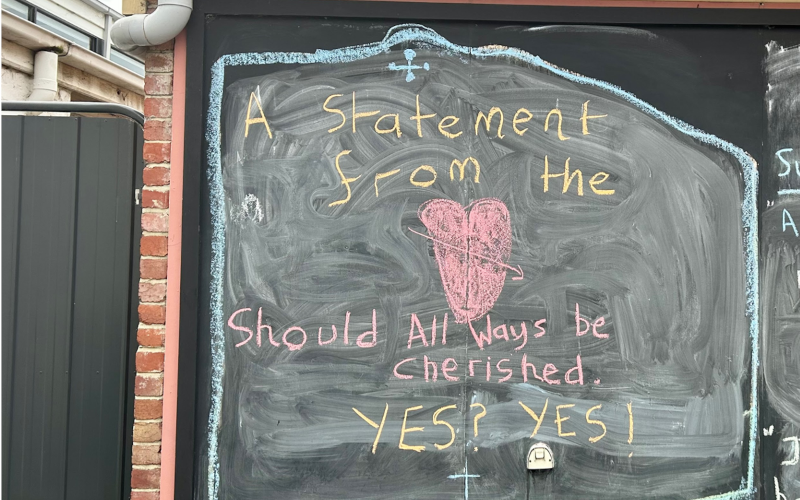A 'Statement From The Heart' should always be cherished
August 19, 2023
How is it that the Uluru Statement from the Heart is even slightly controversial?
How is it that the request for better listening which shapes the request for Voice is found problematic?
I have brought these Australian perplexities with me this week to the Parliament of World Religions in Chicago.
Time and again, it is reaffirmed here in testimony and text, that it is Statements from the Heart which inspire us the most and are what we deeply cherish.
Isnt this a universal wisdom to which we say yes? This is certainly what I hear from people of many faith traditions.
As a disciple of Jesus, I know this daily as I read the stories and statements which the gospel writers wanted to record about Jesus.
And isnt this also the deepest truth from our own relational life?
When someone speaks from their heart we just know to listen.
This intuitive wisdom makes for what is described as Anam Cara-the friendship of souls.
A friend of another faith, who has worked as a pastor at the UN in New York for many years, reminds me of the significance of this.
She recalls that the word ‘heart comes from the Latin cor and points not merely to our emotions but to the very core of the self-the place where all our ways of knowing converge:
intellectual, emotional, sensory, intuitive, imaginative, experiential, relational and bodily.
The heart is where we integrate what we know in our minds with what we know in our bones.
Cor, as my friend reminded me, is also the Latin root from which we get the word courage.
So when our deepest understandings of ourselves in this life on earth come together in our heart, we find the courage to act humanely on what we know.
Last night I listened to inspiring folk at a function of the Charter of Compassion.
For example, a mother, Scarlett, described her co-founding of the Jesse Lewis Choose Love Movement, after her six year old son, Jesse, was murdered at school by a former student with a gun.
The courage of such people gives us all inspiration. They speak of what is possible for the human family when we find the courage to act towards one another with loving kindness.
And, thinking about our own lives again, isnt it what others have done from their hearts for us which are our own sweetest and most grateful memories?
Not the things of transactional relationships but those moments and events that seemed to have had a purely loving intent.
Given my vocation, we have moved around a bit over the years. Sometimes life brings me back in touch with people from those earlier times and places.
Looking back, I might have thought I did this or that of value in those places. But these are not the things people seem to remember or want to talk about.
Instead it is things like a call, a visit or a conversation at moments of significance in their lives.
And, of course, when I think about it, the same is true for me.
It is those words and gestures from the heart of others that have also meant the most to me.
At this multi faith gathering in Chicago, our Elijah Interfaith Institute is addressing the question of what constitutes religious genius as regards those who have inspired us.
Whatever the tradition, the genius is in those who have touched the heart - those who have awoken us to what really matters and whos own service is purely loving.
Just before leaving, perhaps prophetically, I did write on our big Church blackboard facing Bay St. Port Melbourne that A Statement from the Heart should always be Cherished.
Obviously the context was and is public discourse about the Voice.
To focus the significance of this moment for Australia in pointed fashion, there are important insights in a popular book on leadership training.
It is Marshall Goldsmiths book What Got You Here, Wont Get You There.
The essence is that habits of heartless behaviour prevent us from reaching our full potential.
These behaviours include not listening well; expressing endless negativity about another person’s cherished ideas; the withholding of any positive and affirming comment; the kind of negativity that never apologises and which seems to show little commitment to building better relationships.
Sound familiar?
Those who sing in diverse choirs know you have to listen carefully in order to harmonise.
Goldsmiths critique challenges the negativity of the words and tone which are damaging the reconciling opportunity offered in the request for a Voice, embedded in the Statement from the Heart?
To conclude, being here amongst people who come from many difficult places, reminds one of what Australia can offer internationally at a time of much violence and as we all face catastrophic climate change.
We have a robust democracy; a strong economy and a range of substantial intermediaries between the individual and the State. These include our Universities, our Trade Unions, our faith communities, our artists and our non government organisations. We have an appreciation of why there is a separation of powers between the legal and political system and we have a relatively free media.
Everything could be better but where else is there this much that is in place?
Our diverse population is a reflection of this one human family on our beautiful planet in a vast universe.
We can be a continent of compassion, offering hope in international leadership.
But what has got us here will not get us there unless the tone and content of national discourse lifts.
That is why the opportunity of the referendum is so crucial.
All it takes, as the above reflection tries to enunciate, is to recall why we cherish Statements from the Heart.
What is true personally can be true nationally. This is a moment like no other in our national life.
